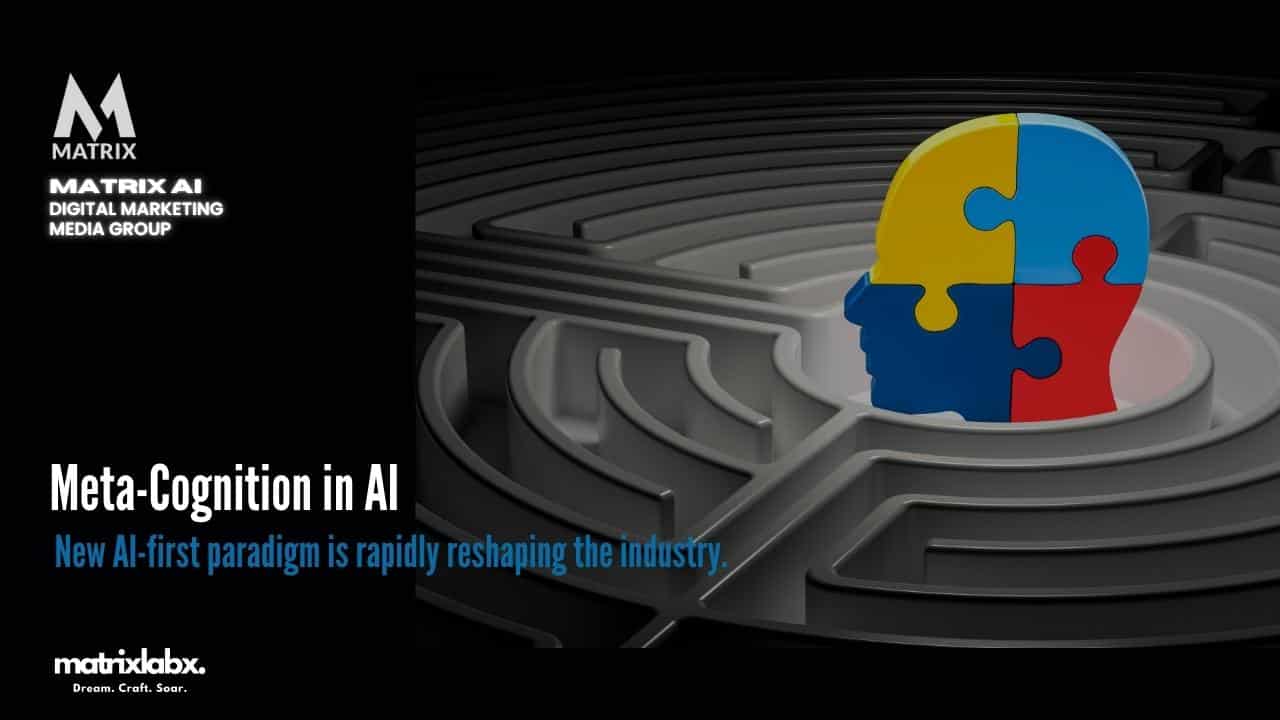AI Meta-Cognition Marketing and Neuro-Symbolic AI
AI Meta-Cognition Marketing, a pioneering focus at MatrixLabX, reshapes how businesses approach strategy, campaign execution, and consumer insights.
With increasing demands for precision, adaptability, and real-time decision-making in marketing, companies are seeking AI solutions beyond automation.
Additionally, we have a labor shortage, or the cost of labor is too high to compete. As we have experienced with our clients over 22 years, people with years of experience either quit or retire.
We are well on our way to solving this problem.
Let’s put this in perspective.
Cost Replacing a Chief Marketing Officer (CMO)

Cost Replacing a Chief Marketing Officer (CMO) can be costly and resource-intensive. When considering direct and indirect expenses, replacing a CMO can range from $500,000 to $1 million or more. Here’s a breakdown of the factors involved:
1. Recruitment Costs
- Executive Search Fees: Hiring an executive search firm typically costs 30-40% of the CMO’s annual salary. With high-level CMOs often earning salaries well into six figures, this fee can range from $100,000 to $250,000.
- Internal Recruitment Time: HR teams invest significant time in screening and interviewing candidates, which costs internal labor hours and diverts them from other priorities.
2. Onboarding and Training
- Training and Onboarding Costs: Familiarizing a new CMO with company-specific processes, teams, and culture can take six months or longer. Training and adjustment costs can add another $50,000 to $100,000 during this period.
- Lost Productivity During Ramp-Up: Even highly experienced CMOs need time to ramp up. The transitional period can temporarily decline strategic momentum, affecting quarterly performance and departmental efficiency.
3. Knowledge and Relationship Loss
- Institutional Knowledge: Long-serving CMOs hold deep knowledge of the company’s brand positioning, history, and market landscape, which isn’t easily transferrable. This lost knowledge can impact ongoing campaigns, product launches, and strategic decisions.
- Relationship Capital: CMOs cultivate critical relationships with partners, vendors, and internal stakeholders. Losing these relationships may require rebuilding trust and rapport, potentially impacting negotiations, media partnerships, and cross-departmental collaboration.
4. Impact on Strategy and Momentum
- Strategic Disruption: A CMO’s retirement can disrupt long-term strategic initiatives. The shift in leadership may lead to altered priorities, misalignment on strategy execution, or halting of projects in progress, affecting brand consistency and market positioning.
- Team Morale and Turnover: Marketing teams often experience uncertainty during leadership transitions. The departure of a well-respected CMO can affect morale, potentially leading to further turnover within the department, which adds additional costs.
5. Lost Revenue and Market Positioning
- Revenue Impact: If the transition disrupts campaigns or product launches, it can have a measurable impact on revenue. CMOs directly influence go-to-market strategies, demand generation, and customer acquisition, all of which are revenue-driving functions.
- Competitive Disadvantage: If competitors perceive instability in the brand’s leadership, they may seize on the opportunity to gain market share.
Total Estimated Cost
The cumulative direct and indirect costs of replacing a CMO can easily exceed $500,000 to $1 million. When factoring in intangible costs—such as lost strategic momentum, relationship rebuilding, and potential revenue impacts—the true cost can be even higher.
Traditional CRM and marketing platforms are often constrained by rigid processes, limiting the depth and agility required for today’s dynamic customer engagement.
MatrixLabX Neuro-Symbolic AI addresses this gap by providing an adaptive and insightful system that learns, reasons, and improves marketing effectiveness through an integrated neural-symbolic framework.
Meta-cognitive AI, equipped with self-assessment and adaptability, operates beyond basic automation, understanding and evaluating its decision-making processes to enhance precision and relevance.
This paradigm shift allows marketers to fine-tune customer interactions, optimize content in real-time, and anticipate market trends with unprecedented clarity.
By harnessing meta-cognition, MatrixLabX empowers brands to move from reactionary marketing to anticipatory insights, fostering a marketing ecosystem where AI performs, continuously learns, and improves.
AIContentPad – On-Brand Content
AIContentPad offers numerous advantages to on-brand content and corporate governance. It enables companies to streamline communication, improve compliance, and support decision-making processes through efficient and reliable content generation.
AIContentPad provides a scalable solution that helps companies uphold and exceed governance standards. This ultimately leads to better decision-making, stronger regulatory compliance, and enhanced organizational accountability.
Unveiling the Power of AI’s Self-Awareness
In a rapidly evolving digital landscape, 85% of businesses leveraging artificial intelligence (AI) have reported significantly increased decision-making speed.
Yet, the next breakthrough lies in faster processing and AI systems that can reflect on their thinking—enter meta-cognition in AI.
As a Marketer, understanding this paradigm shift is crucial for staying ahead in a competitive market.
Addressing Common Concerns: Transparency and Trust
One of the primary concerns surrounding AI is the “black box” nature of many algorithms, which can lead to hesitation in fully embracing AI solutions.
Meta-cognitive AI offers a solution by providing transparency into its decision-making processes. Imagine AI systems that make decisions and explain how they arrived at those decisions.
This level of insight can significantly enhance trust and facilitate better collaboration between AI tools and human decision-makers.
By ensuring that AI systems are efficient and explainable, CMOs can make more informed choices about integrating these technologies into their business strategies.
Evidence-Based Recommendations for Implementation
To successfully implement meta-cognitive AI in your business intelligence framework, start with a phased approach.
- Begin by integrating AI tools that offer clear feedback mechanisms. This will allow your team to understand and trust the system’s outputs.
- Next, invest in training that familiarizes your marketing team with these advanced AI capabilities, ensuring they can leverage the technology to its fullest potential.
- Finally, monitor the performance and accuracy of these AI systems regularly, using metrics that align with your business goals. By taking these steps, you can harness the power of meta-cognition in AI to drive innovation and maintain a competitive edge in your industry.
By embracing this next frontier of AI, CMOs can optimize their marketing strategies and foster a culture of transparency and trust within their organizations.
Meta-Cognition in AI: The Next Frontier for Business Intelligence

What is Meta-Cognition in AI?
Meta-cognition in AI refers to the AI system’s awareness of its cognitive processes, allowing it to evaluate and adjust its methods and strategies for improved problem-solving and decision-making.
This self-reflective capability enables AI to learn from data and its learning processes, enhancing adaptability and efficiency.
Meta-cognition transforms AI from purely task-driven to a more autonomous entity capable of self-improvement, presenting a revolutionary shift in business intelligence.
Why is Meta-Cognition Important for the CMO?
For marketers, meta-cognition in AI is crucial because it can drastically enhance consumer insights and predictive analytics.
With AI that can reflect on its strategies, businesses can develop more nuanced marketing tactics, optimize customer engagement, and anticipate market shifts more accurately.
This leads to smarter data-driven decisions, optimizing ROI, and staying ahead in competitive markets. Our AI system doesn’t just respond to consumer patterns but understands them. It also learns what strategies work best across diverse demographics, adjusting in real time to maximize impact.
Where Will Meta-Cognition Make an Impact?
Meta-cognition in AI is set to increase across marketing departments, transcending traditional decision-making frameworks.
From personalizing user experiences on digital platforms to predicting consumer behavior more precisely, its applications are vast.
CMOs investing in such technology will see tangible benefits in campaign management, brand strategy, and customer retention.
It’s not just about adopting an AI solution—it’s about evolving with a new form of intelligence that thinks about its thinking, fostering innovation and driving a business’s strategic growth path forward.
Unlock Unparalleled Market Insights with AI-Powered Business Intelligence.
Facing the Intelligence Blindspot Marketers (CMOs) are stewards of growth, constantly navigating the complex terrain of ever-evolving market dynamics.
Despite their best efforts, poor market business intelligence often blindsides them, leading to ill-informed decisions and missed opportunities.
Traditional data analytics can be slow, inaccurate, and fragmented, leaving CMOs needing the real-time, comprehensive insights needed to outpace competitors and resonate deeply with their audience.
Unlock Rapid Growth with Our Facebook Ads Starter Kit
Transform your Facebook advertising strategy in just one month.
Get expert strategy, seamless ad setup, and your first month of optimized ads — all designed to put your business on the fast track to success.
The Agony of Misguided Strategies
Incorrect data interpretation results in costly campaigns, diminished brand trust, and dwindling ROI. The marketplace doesn’t wait; competitors leveraging cutting-edge technologies gain ground while time ticks away.
Inattention to shifting consumer preferences can make or break a brand’s reputation, forcing CMOs to scramble in reactionary modes rather than leading proactive, innovative initiatives.
The fallout is evident – misallocated resources, disengaged customers, and the ever-haunting question: “What are we missing?”
Enter AI Marketing Solutions – The Game-Changer
Transform your marketing strategy with AI-powered solutions that elevate your market intelligence from blind spots to bright spots.
Our AI-driven tools offer deep insights, predictive analytics, and a panoramic view of market trends, with precision and speed unmatched by outdated methods.
Imagine crafting marketing decisions with laser-sharp accuracy, honing your strategies to keep pace with and surpass competitors. Our solutions empower you to anticipate customer needs, optimize campaigns, and lead confidently.
Discover a new era of data-driven marketing intelligence, where every decision is informed, intentional, and impactful. Isn’t it time to illuminate your path forward with AI’s unparalleled power?
Unlocking New Horizons in AI: An Expert Take on Meta-Cognition

Embracing Self-Aware AI
“Meta-cognition in AI is akin to giving machines the power to ‘think about thinking.’ This self-reflective AI is poised to revolutionize how businesses leverage data for intelligence.
Unlike traditional AI, which operates within the confines of predefined algorithms, meta-cognitive AI can dynamically evaluate its strategies, optimizing responses in real-time,” claims George Schildge,
CTO at MatrixLabX. Businesses can benefit from this evolution as it allows AI to adapt swiftly to market fluctuations, offering more accurate predictions and stronger strategic insights, thus marking a paradigm shift in business intelligence methodologies.
Transformative Impact on CMOs
“CMOs are on the brink of unprecedented opportunities with meta-cognitive AI,” says Laura Simmons, Marketers at InnovateDigital. “This technology endows marketing strategies with unprecedented adaptability and precision.
AI is not only comprehends consumer behavior but actively reflects on and refines its understanding to anticipate trends better and personalize strategies. The potential for enhanced ROI, customer satisfaction, and brand loyalty is enormous.”
This move towards a self-improving marketing toolset aims to bring marketers closer to the elusive goal of total market resonance, ensuring that every campaign resonates deeply with its intended audience.
Navigating the Ethical Landscape
“As we push the boundaries with meta-cognition in AI, ethical considerations must stay at the forefront,” advises Dr. Raj Patel, an AI ethics consultant. “The self-modifying nature of these systems demands rigorous oversight to prevent unintended biases and ensure that AI reflects human values as it grows more autonomous.”
Patel highlights the need for interdisciplinary collaboration to address potential pitfalls proactively.
Exploring the intersection of technological advancements and ethical frameworks ensures balanced progress where AI’s meta-cognitive capabilities benefit society, reinforcing trust and accountability in business applications.
These expert testimonials underscore the transformative potential of meta-cognitive AI, inspiring businesses to envision new strategic possibilities while navigating the ethical landscape of this cutting-edge technology.
Boost Sales with Agent as a Services
Unlock unparalleled revenue growth with Boost Sales – where advanced technology meets expert human touch. Our Agent as a Service seamlessly integrates data-driven insights with a dedicated team of sales professionals, providing a scalable, on-demand solution that accelerates lead engagement, nurtures prospects, and closes deals faster.
The Evolution of AI: Meta-Cognition as the Next Frontier
Business Intelligence (BI) has evolved dramatically with the proliferation of AI technologies. The next frontier is meta-cognition, the ability of AI to understand decision-making processes.
This opens new possibilities for enhanced transparency, efficiency, and tailored data-driven strategies.
Why Meta-Cognition Matters
Incorporating meta-cognitive capabilities in AI allows organizations to gain deeper insights into what decisions are made and why they are made.
This transparency can foster trust and allow businesses to optimize operations by identifying potential biases or inefficiencies within the AI system.
It’s not just about having data; it’s about understanding the intelligence behind the data.
Inspiring Examples: Unknown Brands Leading the Charge
- Luminos Insight: A promising start-up, Luminos Insight develops AI systems that predict customer behavior and explain the rationale behind those predictions. This capability helps retail clients tailor marketing strategies more precisely, improving sales conversion rates while maintaining customer trust.
- Cortex Analytica: Cortex Analytica excels in the healthcare industry by deploying meta-cognitive AI algorithms that diagnose conditions and transparently explain each step taken by the AI. This detailed explanation aids healthcare professionals in making informed decisions, potentially saving lives by supporting human expertise with reliable AI insights.
- NeuraVista Technologies: Focusing on financial institutions, NeuraVista Technologies offers AI systems that enhance fraud detection. By understanding the underlying reasoning of flagged anomalies, these institutions can refine security measures and improve response times, showcasing meta-cognition as a vital tool in risk management.
Embracing the Future
As these brands demonstrate, employing meta-cognitive AI is paving the way for an era of transparency and enhanced decision-making in business intelligence.
As AI evolves, businesses harnessing this technology will streamline their operations and build stronger, more trustful relationships with their clients and stakeholders.
Curiosity and innovation lie at the heart of this advancement, challenging organizations to look beyond traditional BI and embrace meta-cognition as a critical component of their strategic growth.
Understanding the Matrix of Meta-Cognition in AI
The landscape of business intelligence is evolving rapidly, driven by advancements in artificial intelligence. At the forefront of this transformation is meta-cognition in AI.
But what exactly is meta-cognition, and how can businesses harness it effectively? In essence, meta-cognition refers to an AI system’s ability to understand and evaluate its thought processes.
This introspective capability can revolutionize decision-making, offering deeper and more nuanced insights than traditional methods.
Building the Meta-Cognitive Framework
To integrate meta-cognition into AI, businesses must first establish a robust framework. Begin by identifying the business processes most benefit from self-aware AI insights.
Interview stakeholders to understand the gaps and challenges that AI can address. Subsequently, collaborate with AI specialists to create models that are not just problem-solving entities but capable of self-reflection.
This phase is critical as it lays the groundwork for AI systems that learn from their past decisions and improve future outcomes autonomously.
Implementing and Iterating the System
Once the framework is in place, the next step involves implementation and iteration. It’s crucial to start small, selecting a pilot project or a specific department where meta-cognitive AI can be tested. Deploy the AI and closely monitor its performance.
Note how well it understands and refines its processes—this may involve regular feedback loop sessions for continuous learning.
Adjustments and iterations based on real-time data and feedback will be essential to fully realizing the potential of AI’s meta-cognitive capabilities.
This iterative process enhances AI efficiency and sparks curiosity, inviting businesses to explore innovative applications beyond initial expectations.
Unleash the potential of AI with meta-cognition, and watch as business intelligence takes a giant leap forward, unlocking doors to unchartered territories of strategy and innovation.
Content That Converts: Transparent Pricing for Maximum ROI
Explore Matrix Marketing Group’s Flexible Pricing Plans for Premium Content and Marketing Solutions Tailored to Your Goals.
Exploring Meta-Cognition in AI for Business Intelligence
Understanding Meta-Cognition in AI
Meta-cognition, often called “thinking about thinking,” represents a sophisticated layer of AI development poised to revolutionize business intelligence.
By integrating meta-cognitive abilities, AI systems can enhance their decision-making processes through self-awareness and reflective thinking.
This advancement enables AI to not only process data but also to understand its limitations and adapt accordingly.
Businesses stand to benefit immensely as AI systems with meta-cognitive capabilities improve their ability to anticipate challenges and make informed predictions.
Transforming Business Intelligence
Implementing meta-cognition in AI is set to elevate business intelligence tools to unprecedented sophistication.
With meta-cognition, AI will transform raw data into actionable insights, offering a more nuanced and comprehensive understanding of business contexts. Organizations will witness AI systems that can autonomously improve and optimize performance, leading to more strategic decision-making processes.
This advancement promises a shift from traditional data analysis to a more dynamic model where AI continuously self-improves and evolves.
Challenges and Future Implications
Adopting a meta-cognitive approach in AI presents both opportunities and challenges. While the potential for enhanced intelligence and deeper insights is considerable, businesses must address the complexities of implementing these systems.
Ensuring data integrity, maintaining ethical standards, and handling the increased computational demands are crucial aspects that need attention.
Nevertheless, the promise of AI systems that learn and adapt like human thinkers holds the potential to reshape industries and redefine competitive advantage.
Meta-cognition in AI offers a glimpse into a future where business intelligence is reactive and genuinely proactive.
As companies begin to harness this powerful tool, the landscape of both AI and business intelligence will likely undergo transformative change, fueling curiosity and innovation across sectors.
We asked if we could design a marketing department that could run on its own.
MatrixLabX and Matrix Marketing Group have joined forces to introduce an AI-first, meta-cognitive approach with specialized AI agents powered by advanced Branch Models.
Introducing MatrixLabX Neuro-Symbolic AI—a breakthrough hybrid solution that merges the pattern recognition prowess of neural networks with the logical reasoning and knowledge representation strengths of symbolic AI.
Unlike traditional CRM and rigid marketing automation platforms, our solution is streamlined, adaptive, and clean by design.
This fusion enables a more nuanced and intelligent understanding of customer behavior and preferences, creating a powerful foundation for sharper, data-driven marketing strategies that resonate at every level.
AIContentPad for Enterprises
AIContentPad helps reduce high customer acquisition costs (CAC) by automating content creation for SEO-optimized blogs, social media, ads, and videos. It enables marketing managers to produce high-quality, targeted content faster and at a lower cost. This efficient content strategy attracts more organic traffic and improves conversion rates, minimizing reliance on expensive paid advertising.
Summary
Meta-cognition in AI is the ability of AI systems to understand and evaluate their thought processes.
This introspective capability can revolutionize decision-making, offering deeper and more nuanced insights than traditional methods. Businesses can harness meta-cognition in AI to enhance transparency, efficiency, and tailored data-driven strategies.
Implementing meta-cognition in AI requires a robust framework and iterative process. Businesses should start small, selecting a pilot project or a specific department where meta-cognitive AI can be tested.
Closely monitor its performance, note how well it understands and refines its processes, and adjust based on real-time data and feedback. This will enhance AI efficiency and spark curiosity, inviting businesses to explore innovative applications.
Meta-cognition in AI holds the potential to transform business intelligence. With meta-cognition, AI will transform raw data into actionable insights, offering a more nuanced and comprehensive understanding of business contexts.
Organizations will witness AI systems that can autonomously improve and optimize performance, leading to more strategic decision-making processes. This advancement promises a shift from traditional data analysis to a more dynamic model where AI continuously self-improves and evolves.
Unlock Your Website’s Full Potential with a SEO Fix Program
Even the best websites can struggle without robust SEO. Our $2,500 SEO Quick Fix Package is crafted for businesses that demand fast, measurable results. We start with an in-depth SEO audit to diagnose your site’s performance, then implement five targeted optimizations to boost your rankings and drive more traffic.



